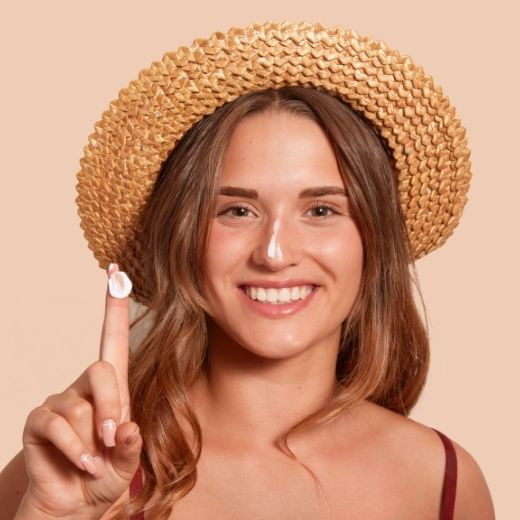How To Choose The Perfect Sunscreen
Posted by Ellie Swain on Jun 3rd 2022
When it comes to looking after our skin, there are a few tasks like toning and using face masks that are optional. However, the step that isn’t up to debate is wearing sunscreen to protect our skin from premature damage.
Despite this, many people skip sunscreen, especially in the colder winter months.
But applying sunscreen is crucial regardless of the weather. Using sunscreen is one of the most effective ways to protect your skin from damaging ultraviolet rays. UV radiation from the sun harms your skin and can lead to skin cancer.
Did you know that around 90% of nonmelanoma skin cancers and the majority of melanomas, which can be more serious, are linked with exposure to UV rays?
Not just that, but UV exposure can also contribute to premature aging of the skin – think wrinkles, fine lines, age spots, and discoloration.
But with so many sunscreens available to buy, from mineral and chemical formulas to ultra-sheer sprays, it can be challenging to choose one. That’s where we come in to help. Keep reading to discover the perfect sunscreen for you.
General Tips for Choosing a Sunscreen
Here are six tips you should consider when choosing a sunscreen.
Look for SPF 30 or higher
To protect your skin as well as possible, seek sunscreens with an SPF of at least 30 or higher. The higher the SPF, the better protection it will provide against UVB radiation.
Check For Broad-Spectrum Protection
It’s also essential to pick a sunscreen labeled broad-spectrum or one that shows it provides coverage against both UVA and UVB rays. Both can contribute to premature aging and skin cancer, so it’s important to check that the sunscreen protects against both.
The EltaMD UV Clear SPF 46 offers long-lasting broad-spectrum protection in a lightweight and silky formula. This fan-favorite can be worn with makeup or alone, and promotes the appearance of healthy skin while protecting from the sun's harmful rays. The long-lasting UVA/UVB protection means you can spend more time having fun in the sun, safely.
See If the Sunscreen Is Water-Resistant
Do you enjoy taking dips in the ocean or swimming pool? Or perhaps you like going for early-morning runs?
If so, it’s essential to check that the sunscreen is water-resistant. Remember, water resistance usually lasts between 40 – 80 minutes after application, so you may need to reapply a few times if you plan to swim and sweat a lot.
The iS ClinicalEclipse SPF 50 is an excellent water-resistant sunscreen, specially formulated for daily use and extended outdoor activities. The sunscreen is a unique fusion of scientifically advanced physical sunscreens – micronized zinc oxide and transparent titanium dioxide, along with pure vitamin E.
This rich blend delivers superior water-resistant, broad-spectrum UVA/UVA protection so you can splash around in the sun for as long as you like. The ultra-sheer, lightweight cream absorbs quickly and easily for a non-greasy matte finish, so you don’t need to worry about that awkward white sheen many sunscreens give.
Choosing a Sunscreen by Skin Type
It would help if you also chose a sunscreen depending on your skin type.
Normal to Dry Skin
If you have dry skin, it’s wise to choose a sunscreen packed with hydrating ingredients like hyaluronic acid or glycerin. If you have normal skin, you can likely choose any sunscreen you prefer. It all comes down to personal tastes and what works well on your skin.
The PCASkin Hydrator Plus SPF 30 is an excellent choice for dry complexions. This nourishing SPF moisturizer is packed with an impressive blend of UV-protecting ingredients, including Z-Cote, an effective barrier that delivers superior broad-spectrum UVA/UVB protection.
The moisturizer is specially developed to replenish the skin’s natural moisture content with water-attracting humectants sodium hyaluronate and sodium PCA for thirsty skin. Caffeine also reduces UV-induced cellular damage, while Silybum marianum extract, otherwise known as milk thistle, stops sun-induced inflammation and the development of sunburn cells.
Oily or Combination Skin
People with oily or combination should seek sunscreens labeled oil-free or non-comedogenic. These labels suggest that the product won’t clog pores or aggravate breakouts.
Look for lightweight and quick-absorbing sunscreens with a matte finish to help absorb excess moisture. Avoid heavy-duty sunscreens, as these could leave your skin looking shiny or greasy.
Sensitive Skin
If you have sensitive skin, opt for a physical sunscreen. These are also known as mineral blockers, and they contain zinc oxide or titanium dioxide. These ingredients tend to be less irritating than chemical filters.
People with sensitive skin should also stay away from products containing fragrances or other additives that may be harsh or irritating to the complexion.
Explore our wide sun care collection here to ensure your skin is protected from the sun’s beating rays. We have everything from tinted moisturizers for a bronzed, glowing look to SPF 50 sunscreens for ultimate sun protection.

